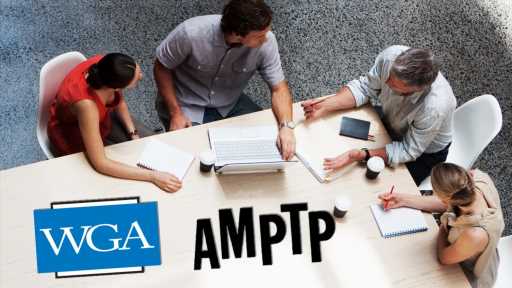
WGA Says AMPTP’s Latest Contract Offer “Is Neither Nothing, Nor Nearly Enough”
August 25, 2023The Writers Guild said Wednesday that the AMPTP’s latest counteroffer for a new contract “is neither nothing, nor nearly enough.”
In a message to its members released today, the guild said it “will continue to advocate for proposals that fully address our issues rather than accept half measures like those” offered by the companies in its latest offer August 11. The guild said that “we remain committed to direct negotiations with the companies.” The strike is now in its 115th day.
Related Stories
WGA Slams Studios’ Latest Offer & Meeting As Attempt To Make Guild “Cave”; “Not To Bargain, But To Jam Us”
Studios Reveal New AI, Data Transparency & Residuals Proposals To WGA; Guild Meets With CEOs
In today’s message, the WGA concedes that the companies have come closer, but not close enough, to meeting several of the guild’s demands on several key strike issues. On the hot-button issue of artificial intelligence, the guild said: “We have had real discussions and seen movement on their part regarding AI protections. But we are not yet where we need to be.”
For their part, the companies have confirmed “that because generative artificial intelligence (GAI) is not a person, it is not a ‘writer’ or ‘professional writer’ as defined in this Minimum Basic Agreement (MBA) and, therefore, written material produced by GAI will not be considered literary material under this or any prior MBA.”
The AMPTP says that this proposal “provides important safeguards to prevent writers from being disadvantaged if any part of the script is based on GAI-produced material, so that the writer’s compensation, credit and separated rights will not be affected by the use of GAI-produced material.”
The WGA, however, says that the companies “continue to refuse to regulate the use of our work to train AI to write new content for a motion picture.”
Minimum staffing and duration of employment for members working in TV writers’ rooms is another strike issue, and here, too, the companies have made concessions after initially saying that the guild’s proposal amounts to “a hiring quota that is incompatible with the creative nature of our industry.”
In its latest proposal for high-budget SVOD and pay television series or serials, for instance, the AMPTP has counteroffered that “the Showrunner may select at least two writers to be employed (together with the Showrunner) for a period of at least 20 consecutive weeks in the writers’ room, but not to exceed the duration of the writers’ room.”
But this doesn’t go far enough for the guild, which said today that the companies “introduced the notion of an MBA guarantee of minimum staff size and duration. But the loopholes, limitations, and omissions in their modest proposal, too numerous to single out, make them effectively toothless.”
And with respect to transparency, the guild says that “the companies say they have made a major concession by offering to allow six WGA staffers to study limited streaming viewership data for the next three years, so we can return in 2026 to ask once again for a viewership-based residual,” but in the meantime, “no writer can be told by the WGA about how well their project is doing, much less receive a residual based on that data.”
The companies have also agreed to a guaranteed “second step” for theatrical screenplays, meaning that when a company initially employs a writer to write the first draft of an original screenplay, it will be required to provide the writer the first opportunity to perform a rewrite at no less than the applicable minimum compensation.
The guild, however, says that that “this would only apply to “a statistically tiny category of screenwriters, excluding all but the first writers of original screenplays.”
The guild has also demanded that writing teams be entitled to receive full pension and health contributions, and here, too, the AMPTP has made a concession after initially rejecting the idea and refusing to make a counteroffer. Under the AMPTP’s latest offer, teams of two writers would receive P&H contributions as individuals, “but the guild says notes that this would not apply to teams of three or more writers.
The guild also complained that many of the AMPTP’s latest proposals, including pay raises, “are from a deal negotiated with the DGA more than 80 days ago.”
Read the WGA’s full message below.
No new negotiations have been scheduled for now as hopes for a breakthrough to end the ongoing writers strike were dashed Tuesday night following a much-anticipated meeting between the guild, the AMPTP and the CEOs of Disney, Netflix, Universal Pictures and Warner Bros Discovery, which the guild earlier had called “a meeting to get us to cave.”
After the two sides met, the Alliance of Motion Picture and Television Producers unveiled what it called a “comprehensive” package of proposals that it gave to the guild August 11, claiming that it “addresses all of the issues the guild has identified as its highest priorities.” According to the AMPTP, its latest proposal, “substantially improves upon the AMPTP’s prior proposals. The comprehensive package also features first-of-their-kind offers for writers, including unprecedented terms in the areas of Generative Artificial Intelligence, data transparency and minimum staffing.”
After releasing its proposals, AMPTP president Carol Lombardini said: “We have come to the table with an offer that meets the priority concerns the writers have expressed. We are deeply committed to ending the strike and are hopeful that the WGA will work toward the same resolution.”
That offer, however, remains unchanged after four days of bargaining last week. And on August 17, the guild upped the ante by releasing an “antitrust” report that called for more government regulation of what it calls the “anti-competitive practices” of Disney, Amazon and Netflix, which it accuses of “abusing their dominance to further disadvantage competitors, raise prices for consumers, and push down wages for the creative workforce.”
See the AMPTP’s August 11 offer here.
Following Tuesday’s meeting with the CEOs, however, the guild said that “the companies’ plan from the beginning” was “not to bargain, but to jam us. It is their only strategy – to bet that we will turn on each other.”
Today, the WGA’s negotiating committee issued a more complete statement on the status of the negotiations.
Here is that statement in full:
As promised, here’s a more detailed explanation of where we are in the negotiations:
On Friday August 11th after 102 days on strike, the AMPTP gave us the counteroffer they publicized Tuesday night August 22nd. The Guild responded with our own counterproposal on August 15th, and there were discussions about a few issues on Wednesday and Thursday last week. On Friday August 18th late afternoon, Carol brought us in for a session that lasted under ten minutes and consisted of the companies making two minor moves on TV issues.
On Monday, the call came to meet with Carol and four of the CEOs on Tuesday night, August 22nd, with an indication the companies were finally ready to get serious about bargaining for a deal. As we reported, the basic message of that meeting was that the companies’ first and only counteroffer to the WGA since the start of the strike, made 11 days before, was and had to be the basis for the only deal they were willing to make.
During the meeting with the CEOs we spent two hours explaining that, though progress had been made, the language of the AMPTP’s offer was, as is typical of that body, a version of giving with one hand and taking back with the other.
We repeated what we have said since day one, that our demands come directly from the membership itself. They address the existential threats to the profession of writing and to our individual careers, all caused by changes to the business model implemented by the companies in the last seven to ten years. We stressed that we could not and would not pick and choose among those threats; that we have not struck for nearly four months to half-save ourselves, nor are we leaving any sector of this Guild unprotected when we return to work. We are willing to negotiate within these areas, but every existential issue must be met with a genuine solution.
At the end of the meeting, the companies told us they intended to go directly to our membership by releasing information on their August 11th proposal to the media ‘within the next 24 hours.’ They released a six-page document 20 minutes after the meeting concluded.
This should be seen as what it is, simply a tactic in the middle of an ongoing negotiation.
We aren’t going to negotiate by press release, so won’t go through the AMPTP’s characterization of its August 11th proposal in detail, but here are some broad strokes that may already be apparent:
Many of the current deal points they have put forward – minimums, SVOD residuals, AVOD terms – are from a deal negotiated with the DGA more than 80 days ago.
Member power – the strike – forced the companies to negotiate on more issues than they were willing to as of May 1, but still in the typical AMPTP mode of seeming to give while limiting the actual gains. Here are a few examples of areas they’ve made proposals that are not yet good enough:
- In screen, they have proposed a second step but only for a statistically tiny category of screenwriters, excluding all but the first writers of original screenplays. They dismissed the concept of weekly pay.
- They have ceded selected – but insufficient – minimum terms for some-but not all-Appendix A writers in SVOD. For example, while comedy-variety is covered, game show writers, daytime writers, and all other Appendix A writers are not covered.
- In television, the companies have introduced the notion of an MBA guarantee of minimum staff size and duration. But the loopholes, limitations, and omissions in their modest proposal, too numerous to single out, make them effectively toothless.
- Teams of two writers would receive P&H contributions as individuals. But not teams of three or more.
- We have had real discussions and seen movement on their part regarding AI protections. But we are not yet where we need to be. As one example, they continue to refuse to regulate the use of our work to train AI to write new content for a motion picture.
- Finally, the companies say they have made a major concession by offering to allow six WGA staff to study limited streaming viewership data for the next three years, so we can return in 2026 to ask once again for a viewership-based residual. In the meantime, no writer can be told by the WGA about how well their project is doing, much less receive a residual based on that data.
The companies’ counteroffer is neither nothing, nor nearly enough. We will continue to advocate for proposals that fully address our issues rather than accept half measures like those mentioned above and other proposals not listed here.
One last reminder illustrates why the AMPTP’s current stance doesn’t make sense. As we have repeated from the first day of our first member meeting – and on every day of this strike – our demands are fair and reasonable, and the companies can afford them. Here is the cost to each company of our current asks on the table, including the addition of increased health funding to address the impact of the strike.
Weigh this against the cost of not making a deal: the cost to 11,500 writers; to actors, crews and drivers; to anyone who works in and around the business but is not on strike; to the economies of California and New York and everywhere film and television is made; to consumers, pension plans and other shareholders; and to the companies themselves. It makes no sense. And everybody but the AMPTP knows it.
In the last 36 hours the response from the membership is that you are undeterred by this latest tactic. Despite the AMPTP’s attempt at a detour around us, we remain committed to direct negotiations with the companies. That’s actually how a deal gets made and the strike ends. That will be good for the rest of the industry and the companies as well.
Until then, we will see you on the picket lines.
Must Read Stories
Six Takeaways From British TV Festival: Strike Ripples, Commissioner Slowdowns & More
WGA On AMPTP’s Latest Contract Offer: “Neither Nothing, Nor Nearly Enough”
‘Dune: Part Two’ Deserts 2023 Slot; ‘LOTR: War Of The Rohirrim’ Pushed
Mug Shot Released After Arrest In Georgia On Charges Tied To 2020 Election
Writers Guild Strike
Two Assistant Directors Create Strike Fund For Production Assistants: “They Have Been Forgotten”
Writers Strike Takes Center Stage In WGA East’s Officer & Council Election
Read More About:
Source: Read Full Article









